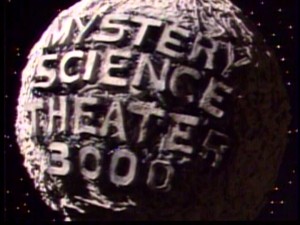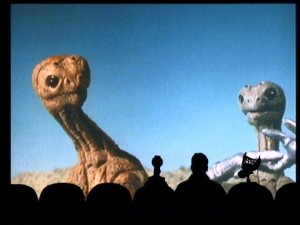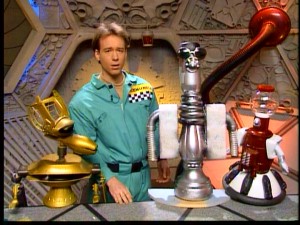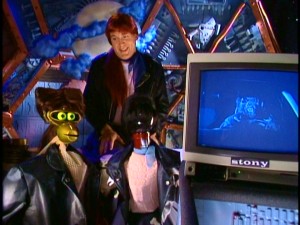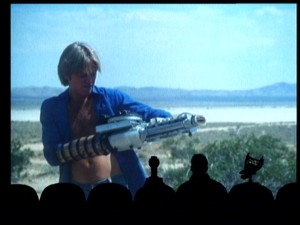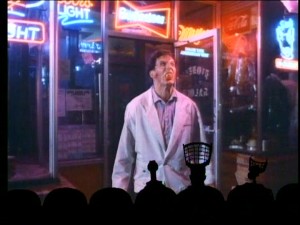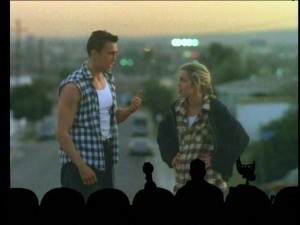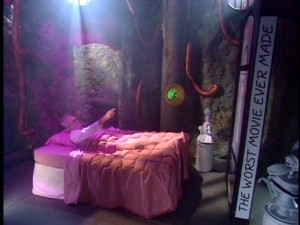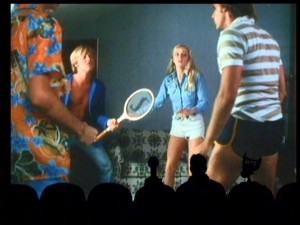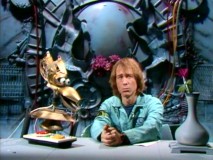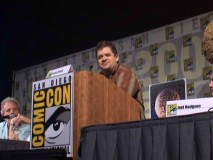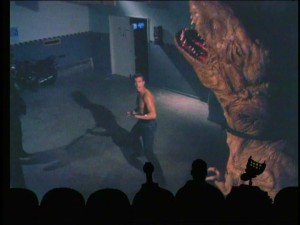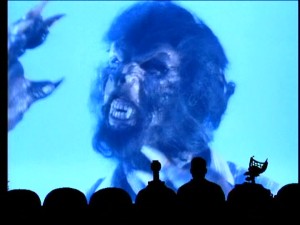"Mystery Science Theater 3000" 20th Anniversary Edition DVD Review
Buy from Amazon.com • Buy in Collectible Tin from Amazon.com
"Mystery Science Theater 3000" was anything but your typical television show. It began in 1988 on a local Minneapolis UHF station. Founded on the belief that bad movies can be a lot of fun with the right attitude and company, the series consisted of showing low-budget movies behind silhouettes of three sarcastic commentators. From local TV, "MST3K" (as it's commonly known) graduated to cable, providing some of the first programming for The Comedy Channel and then Comedy Central. The show spent much of the 1990s on Comedy Central, where it won a Peabody Award and was nominated for multiple Emmys. In 1993, Hodgson left, head writer Michael J. Nelson took on the lead human role (now "Mike"), and the series continued as usual. In 1996, after seven cable seasons and more than 100 two-hour episodes, the show was cancelled. But massive fan outpouring paved the way for the series to soon continue. Within a few months, new episodes began airing on the Sci-Fi Channel, where it stayed through 1999.
Though the show has now been out of production for nine years and out of reruns since 2004, it lives on. The spirit has been upheld in Hodgson and colleagues' similar, subsequent B-movie-riffing projects Cinematic Titanic, RiffTrax and The Film Crew. As for the nearly 200 episodes and specials that made up the series itself, they continue to delight on DVD. Rhino Entertainment's video division released individual episodes and collections on DVD since 2000.
Now, Shout! Factory (a company spun off by former Rhino execs) has acquired distribution rights and makes its MST3K debut with this box set. Mystery Science Theater 3000: 20th Anniversary Edition holds four episodes spanning from 1990 (the second season on Comedy Channel) to 1999 (one of the final Sci-Fi Channel shows). Three of the four are from the Mike Nelson-hosted period. The heckled films range from 1960's First Spaceship on Venus to a pair of mid-'90s movies that unsurprisingly went straight to video with whimpers. All are new to DVD and they're accompanied by their original trailers, a feature-length "MTS3K" documentary, a 2008 Comic-Con panel discussion, and -- apparently -- some collectible tangible treats.
The silhouettes are there largely just to explain the voices we hear. Visually, beyond moving mouths, they rarely add anything more special than to announce an impending on-camera segment.
The laughs come from the movies' cheesiness and from the speakers' remarks. The most effective ones offer an apt, perfectly-timed union between the film's visuals or chronology and the barb. When done just right, hearty hilarity ensues. The speakers alone don't have the highest percentage of success. Everything they say is meant to be a joke, and their comments aren't a non-stop stream. Still, if this were major league baseball, their performances would merit Hall of Fame admittance. Once in a while, giant guffaws do emerge.
Still, many of their references to movies, actors, musicians, and commercials, will fly over viewers' heads, even those schooled in cinema and media. Young people, and even those who were young when these first aired, absolutely won't get every passing comment. The obscurity does, however, heighten the humor for those who get the allusions.
In what qualifies as a mild disappointment, none of the movies are offered in their original forms. That was a luxury afforded by all the earliest Rhino DVD releases. While you don't get an ideal viewing of the lampooned movies in the MST3K versions, they're probably not as much fun on their own. Still, if they were already cleared this way, it would have been nice getting them sans commentary without having to buy them separately, particularly in light of the typically high cost the legally-challenged series fetches.
2.11: First Spaceship on Venus (1960) (1:37:30) (Episode first aired December 29, 1990)
7.06: Laserblast (1978) (1:32:08) (Episode first aired May 18, 1996)
9.04: Werewolf (1996) (1:31:56) (Episode first aired April 18, 1998)
In the theater, a fall convinces Mike he's James Lipton interviewing Ray Liotta and another one turns him into a WereCrow. In addition, Mike and the robots discuss what brothers they'd cast in their own werewolf movies, perform a werewolf doo-wop song like a '50s girl group, and turn the end credits chanting into an inspired medley of well-known songs.
10.04: Future War (1997) (1:31:56) (Episode first aired April 25, 1999)
VIDEO and AUDIO
"MST3K" is definitely not something you'll use to show off your home theater's picture and sound capabilities. The featured movies show their age or low budget with noticeable wear. Their colors are always faded, their prints generally unsteady and sometimes littered. The original content from the show isn't perfect either, but it's satisfying enough considering the modest production values. Like your typical 1990s cable TV program, the picture is fullscreen and the sound is Dolby Stereo. Neither subtitles nor closed captions are provided, which is annoying since this is a show where either would occasionally come in handy to clarify or confirm a comment or line.
BONUS FEATURES
The big standout extra is the 81-minute documentary "The History of MST3K" that's divided into roughly even parts on Discs 1 through 3. Chronological and thorough, this lengthy piece is comprised chiefly of clips from new interviews of 13 individuals, which are complemented by relevant show excerpts. Among those interviewed are creator/original star Joel Hodgson, head writer/second host Michael J. Nelson, producer/director Jim Mallon; and writer/performers Trace Beaulieu, Kevin Murphy, J. Elvis Weinstein, Frank Conniff, Mary Jo Pehl, and Bill Corbett. Also seen are writers Bridget (Jones) Nelson and Paul Chaplin and official MST3K fan site administrators Brian Henry and Chris Cornell.
Part 1 (25:25) provides good coverage of the series' start, detailing how original concepts came together, the inspiration for the silhouette format, the process of improvising riffs, and penning the expositional "Gilligan's Island"-esque theme song. There's some footage from the earliest shows that aired on Minneapolis' KTMA and reminiscing of its warm reception there. Part 2 (23:05) discusses changes that were made in moving to cable, the lucky stroke of retaining copyrights, the addition of writers, the process of group scripting during a viewing, creating secondary sketches, and (very briefly) Joel's departure and the subsequent recasting. Part 3 (32:25) proceeds to tackle the 1996 movie and its extremely limited rollout, the show's cancellation and move to the Sci-Fi Channel, more personnel changes occurring in the later seasons, the show's passionate fan base, and the newsletter. This final part includes some brief glimpses of the MST3K live show and fan conventions.
In addition, each DVD contains the original trailers for the ridiculed feature, which are all the more amusing since they're serious and unedited. Each preview runs 80-100 seconds. Laserblast's is especially hilarious ("Prepare to have your mind blown"), and Werewolf prominently features parts of an apparently cut sex scene.
Another substantial supplement is found on Disc 4: "MST3K at Comic-Con '08" (37:57). Hosted by comedian Patton Oswalt, the 20th anniversary panel features eleven cast/crew members you'll recognize from the set's documentary (and many from the show itself, of course). "Variations of a Theme Song" (9:30) provides the different opening title sequences that MST3K employed over the years. Though the gist of the exposition remains the same, the lyrics, imagery, and cast change and that's enough to make this a nifty reel. Each sequence runs a little over 90 seconds.
Disc 1 opens with a number of previews from the "Shout! Factory Trailer Workshop" which showcase "Oban Star-Racers": The Complete Series, "Code Monkeys": The Complete First Season, and "Swamp Thing: The Series" - Volumes 1 & 2.
MENUS and PACKAGING
The animated but low-key menus feature CGI versions of Tom Servo and Crow T. Robot in a varying location (alien planet, desert, and the regular spaceship) while a small slideshow previews the disc's film. Appropriate sound effects are heard, be they spacey noises on Venus or the loud tribal chants on Werewolf. Chapter stops are provided but a designated scene menu is unfortunately absent.
This DVD was announced as coming in a collectible embossed tin with lobby cards and a Crow T. Robot figurine. My review copy didn't have any of that, making it quite a bit tougher to justify the set $70 list price. I'm guessing that retail versions will have all that was announced and I just got the ordinary cardboard box inside. Inside that, the discs are packaged in four clear slimcases. Each one boasts cover artwork resembling vintage B-movie poster designs. A fold-open mini-booklet advertises Shout Factory DVDs and CDs.
CLOSING THOUGHTS
"Mystery Science Theater 3000" is certainly entertaining and, at times, riotous. But based on its length and format, it doesn't have as much replay value as most other TV shows you might enjoy as much. The considerable list price also encourages renting over buying, especially from this review copy's exclusion of the tin, figures, and lobby cards. Still, if you're looking to own some of this unique and funny program, this bonus-bountiful collection may be as good a value as any other pricey MST3K DVD, especially with preorder/release week discounts.
More on the DVD / Buy from Amazon.com / Buy in Tin with Figures from Amazon.com
|
Related Reviews:
DVDizzy.com | DVD and Blu-ray Reviews | New and Upcoming DVD & Blu-ray Schedule | Upcoming Cover Art | Search This Site
New to DVD: NewsRadio: The Complete Series • Indiana Jones and the Kingdom of the Crystal Skull • Iron Man
2001: A Space Odyssey • The Godfather Trilogy (The Coppola Restoration) • Peanuts Deluxe Holiday Collection
The Black Hole • Eat My Dust (Supercharged Edition) • Strange Wilderness • Jumper • Transformers • Lake Placid 2 • Cloverfield
COPS: 20th Anniversary Edition • Freakazoid!: Season 1 • The Best of The Colbert Report • Reno 911!: The Complete Fifth Season
The Muppet Show: Season Three • Alvin and the Chipmunks Go to the Movies: Daytona Jones and the Pearl of Wisdom

